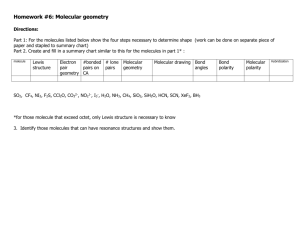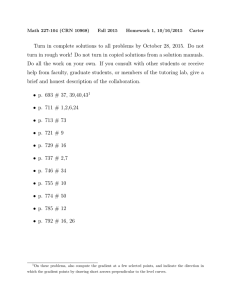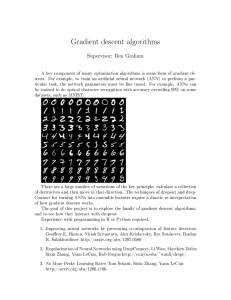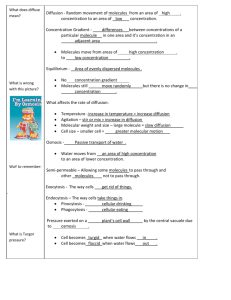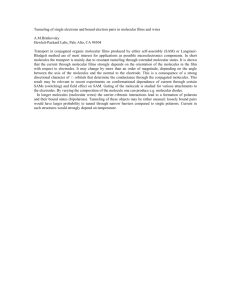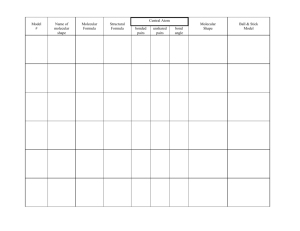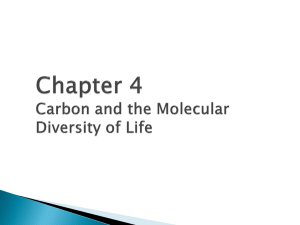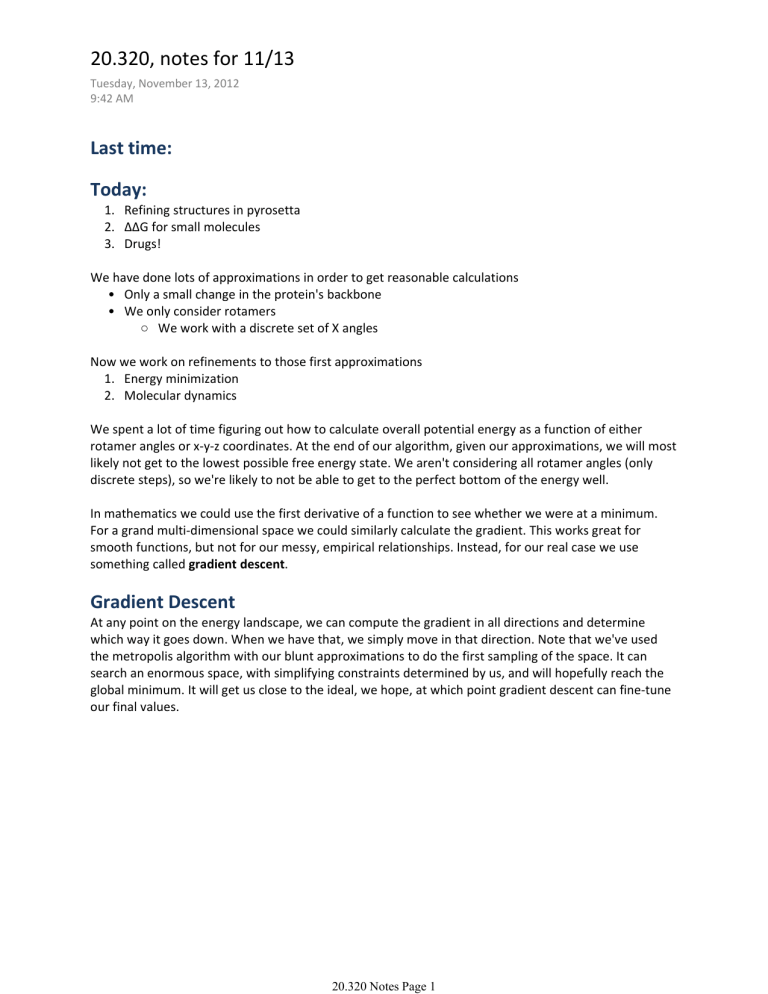
20.320, notes for 11/13
Tuesday, November 13, 2012
9:42 AM
Last
time:
Today:
1.
Refining structures pyrosetta
2.
ΔΔ G for small molecules
3.
Drugs!
We have done lots approximations order get reasonable calculations
• Only small change the protein's backbone
• We only consider rotamers
○ We work with discrete set angles
Now we work on refinements those first approximations
1.
Energy minimization
2.
Molecular dynamics
We spent lot time figuring out how calculate overall potential energy function either rotamer angles x ‐ y ‐ z coordinates.
the end our algorithm, given our approximations, we will most likely not get the lowest possible free energy state.
We aren't considering rotamer angles (only discrete steps), we're likely not be able get the perfect bottom the energy well.
In mathematics we could use the first derivative function see whether we were minimum.
For grand multi ‐ dimensional space we could similarly calculate the gradient.
This works great for smooth functions, but not for our messy, empirical relationships.
Instead, for our real case we use something called gradient descent .
Gradient
Descent
At any point on the energy landscape, we can compute the gradient directions and determine which way goes down.
When we have that, we simply move that direction.
Note that we've used the metropolis algorithm with our blunt approximations do the first sampling the space.
can search an enormous space, with simplifying constraints determined us, and will hopefully reach the global minimum.
will get close the ideal, we hope, which point gradient descent can fine ‐ tune our final values.
20.320 Notes Page 1
Molecular
Dynamics
For this method, we start assuming that forces (from molecular interactions) act on every atom and affect their motion.
For each atom we can calculate current location and figure out where will be given velocity and the acceleration caused the forces around over small time step.
Atoms will move until they reach the state lowest energy within well.
Note that both gradient descent and molecular dynamics are unable jump over an energy barrier reach lower global minimum elsewhere.
They are always stuck whichever local minimum they start out at.
That's why we run the Metropolis Algorithm first.
20.320 Notes Page 2
ΔΔ
G
for
small
molecules
Let's shift our focus the sort substances that most drugs are: small molecules.
How do we apply these concepts we've learned?
For that we need look how drugs are designed.
There are ways:
Analog ‐ based design
It's been around for thousands years.
was the only way before computer simulations.
The idea take starting material known have therapeutic effect (like salicylic acid).
You try whole lot chemical modifications (like acetylation, among many), and you assay for effectiveness until you find the best (acetylsalicylic acid, Aspirin).
The most rigorous and modern way doing this through method called QSAR (Quantitative
Structure Activity Relationships).
The idea also change stuff randomly onto starting molecule, but then you try see whether there's pattern the data.
there any characteristic our molecules that seems correlate with greater effectiveness?
so, we try maximize more that.
There also popular equivalent the toxicology world, where they use TEST (Toxicity Estimation
Software Tool) determine the toxicity stuff essentially the same method.
20.320 Notes Page 3
Structure ‐ based design
All this looks very similar protein design.
They also calculate free energy diagrams and what not.
However, there are some important differences.
The search space for drugs much, much greater than the already astronomical search space for proteins.
Proteins
Limited number variables
(20aa)
Drugs
An estimated 10 60 compounds that would make realistic drug candidates
Mostly fixed backbone Nope
Known active site mess with Active site(s) unknown
So imagine we want see where small molecule binds given protein.
The way do search around the protein, dock the drug somewhere, and create score for that binding spot.
The scoring, course, comes from the same tools that we'd used before.
Calculate which spot shows the lowest potential energy interaction.
To do our search, we need six independent degrees freedom.
Three are for location and three for orientation (the equivalents roll, pitch, and yaw, use the aerospace analogy).
This enough describe potential interaction sites.
for how sample them, we again bring our method for sampling enormous sample spaces: the Metropolis Algorithm.
Does this work?
Well, certainly reduces the search space.
good determining the really bad binders, even has more difficulty telling apart the good ones.
Just knowing what ignore, though, already great starting point for the pharmaceutical industry.
You find leads and then try improve on them.
The leads can be analyzed X ‐ ray crystallography NMR see exactly how the drug fact binds the protein.
Pharma
priorities
The pharma industry lore has created the labels good targets and good drugs.
Good targets are those that are likely be monetary hit.
They have made lists what they call
20.320 Notes Page 4
druggable and undruggable targets.
The druggable ones are those for which we already have several examples working drugs (kinases, GPCRs, Ion channels) that we can use starting material.
The undruggables are those that nobody has tried, that many have tried and failed at.
More important for our discussion, though, what makes good drug .
How do you sift through 10 60 candidates?
Well, there are considerations other than the molecular interactions.
This where we look at ADME/Toxicity, the short list considerations that will make break potential drug:
• Adsorption
• Distribution
• Metabolism
• Excretion
Most drugs are small molecules taken orally.
Their life cycle inside the body looks something like this:
So when the industry looks molecule, needs consider the above.
How do they do it?
Well, they rely on lots calculations and few famous rules thumb.
One the most famous was put together guy called Lipinsky, based on his experience what has and hasn't worked the history of the pharma industry.
short list the things that successful drug should not have.
Lipinsky's Rule Five
A good drug candidate should NOT have:
• More than H ‐ bond donors
• Molecular weight 500 Da
• Sum atoms 10
• High lipophilicity, defined below:
݈݃
ܦ
௧
ܦ
௪௧
൨ 5
• Also avoid an area 140 square angstroms
20.320 Notes Page 5
• Avoid formal charge
20.320 Notes Page 6
MIT OpenCourseWare http://ocw.mit.edu
20.320 Analysis of Biomolecular and Cellular Systems
Fall 20 1 2
For information about citing these materials or our Terms of Use, visit: http://ocw.mit.edu/terms .
